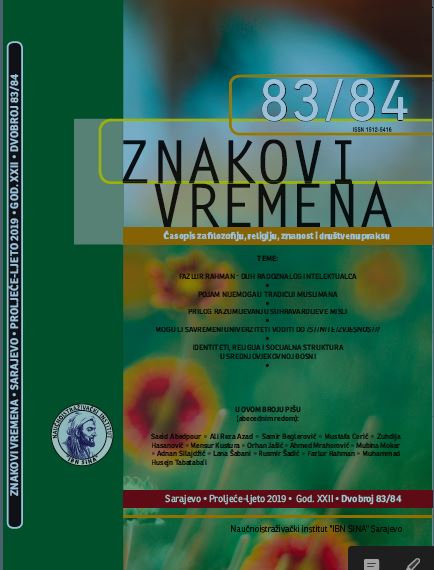Naim Frashëri – kreator albanskog identiteta
Naim Frashëri - creator of Albanian identity
Author(s): Saeid AbedpourSubject(s): History, Ethnohistory, Identity of Collectives
Published by: Naučnoistraživački institut »Ibn Sina«
Keywords: Naim Frashëri; Albanian nationalism; Albanian identity; Bektashi Tariqah; Qerbelāyā; Skenderbeg
Summary/Abstract: This paper will deal with the influence of two important religious and political works by Naim Frashëri, Qerbelājā and History of Skenderbeg, and author’s political efforts in defining Albanian identity. Naim Frashëri (1846-1900), together with his brothers Sami and Abdel, played an important role in the Albanian national movement. He was a Bektashi, a writer and a political thinker. He devoted the first half of his political life to the service of the Ottoman authorities, where he was known as one prominent writer. From 1878 to 1881 he acted within framework of the movement ‘The Prizren League’ and then went to Istanbul. During his twenty-year-old stay in Istanbul, he grew up in the prominent leader of the language movement and independence of Albania. In the political thoughts of Frasheri, the Bektashi Tariqah and worldview, religious and political preferences, as well as the National Movement for Defining Albanian Identity, played an important role. In the work Qerbelājā (1898), Frasher describes events of Karbala and Shahadah of Imam Husayn, but also speaks of freedom and the humanistic enlightenment thought. In his view, Imam Husayn (a.s.) is the embodiment of justice and freedom against discrimination and the violence of authorities, and describes the history of Karbala as a history of the struggle between justice and injustice, describes it as justice and freedom. Qerbelājā represents an effort to redefine the religious concepts in the form of the history of Karbala with the aim of humanistic ethics and the purification of the soul. Frasher connects Karbala with the history of his time. He believes that Ottoman rule is the same as the rule of Muawiyah Mervan, a factor of violence, discrimination and injustice, and all Albanians who stood up against this government are at the level of the Shahids of Karbala. Therefore, the struggle of Albanians against the Ottoman rule is equal to the struggle at Karbala. In the final chapter of Qerbelāja, Frashėri no longer speaks of Karbala and focuses on the issue of the National Movement. Of the 25 chapters of Qerbelāja, 24 of it speaks of Karbala, and the last chapter deals with the Albanian National Movement. The history of Skenderbeg (1898) is an epopee about the Albanian national hero Skenderbeg, who for 25 years opposed the Ottoman assaults. Skenderbeg is not only an Albanian but also a European Christian hero against Muslim Ottomans. As some Muslims had a problem with imam Ali as a Caliph, the same happened to Skenderbeg. He was an Albanian Muslim and Christian leader who opposed the Ottoman aggression. The book compares events between Muawiyah and Imam Ali and the Ottomans and Skenderbeg as two opposing forms of the rulers, a tyrant ruler and a righteous ruler.
Journal: Znakovi vremena - Časopis za filozofiju, religiju, znanost i društvenu praksu
- Issue Year: XXII/2019
- Issue No: 83/84
- Page Range: 157-172
- Page Count: 16
- Language: Bosnian

